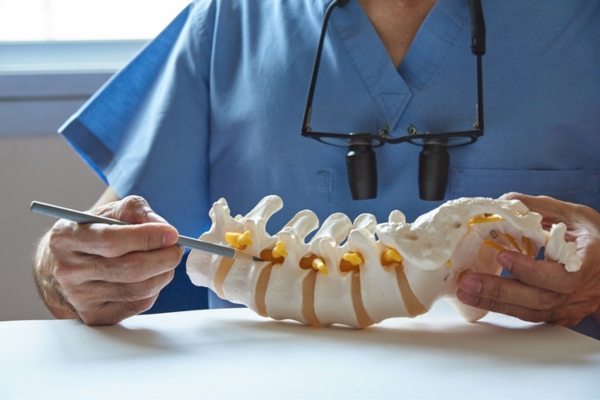Back surgery doesn’t always lead to lasting pain relief. In fact, many people continue to experience chronic discomfort even after procedures intended to correct their spine issues—a condition known as Failed Back Surgery Syndrome (FBSS). At the Center for Regenerative Therapy & Pain Management, we help patients find effective, non-surgical solutions after surgery hasn’t worked.
Failed Back Surgery Syndrome refers to persistent or worsening pain following one or more spine surgeries. It doesn’t mean your surgery failed entirely—it simply means your pain continues despite the procedure.
In many cases, FBSS is caused by unresolved nerve compression, scar tissue, or problems that weren’t fully addressed by the initial surgery. The pain is real and valid, and with the right care, it can be effectively managed without going back under the knife.
By targeting this space, epidural injections help reduce swelling and nerve irritation, providing pain relief for patients suffering from back, neck, or radiating nerve pain. This minimally invasive procedure is often used when conservative treatments like physical therapy or oral medications haven’t provided enough relief.

Sometimes, the initial surgery may not fully relieve pressure on spinal nerves, or new compression can develop later. This can lead to continued or even worsened pain after surgery.
After any spine surgery, scar tissue can form around the nerves. This buildup can interfere with nerve function and cause chronic pain or tingling sensations.
If the initial pain source wasn’t accurately identified, surgery may have been performed in the wrong area. This often results in no improvement or even new pain following the procedure.
In some cases, surgery alters the natural movement or alignment of the spine. This instability can place strain on surrounding joints, muscles, or discs and lead to recurring pain.
Even after a disc is treated, it may herniate again—either in the same spot or at a nearby level. This re-injury can bring back many of the same symptoms experienced before surgery.
Ongoing inflammation in the surgical area can irritate surrounding nerves and tissues. This often leads to pain flare-ups that don’t respond to standard recovery timelines.

FBSS symptoms often overlap with the original pain but may also include new or worsened sensations, particularly nerve-related issues:
Chronic back or neck pain
Pain radiating into the arms or legs
Burning, tingling, or numbness
Muscle weakness
Limited mobility or function
Pain that worsens over time instead of improving
We start by reviewing your surgical history and evaluating how your symptoms have changed since the procedure. A thorough diagnostic workup helps us pinpoint the real source of your ongoing pain.
We may use:
Imaging (MRI or CT scans) to identify structural issues
Nerve conduction testing to assess nerve damage
Diagnostic injections to locate the exact pain generators

Reduce inflammation and ease pressure on irritated nerves.
Interrupt pain signals and identify nerve-specific pain
Target and deactivate nerves responsible for chronic pain
A device that disrupts pain signals before they reach the brain
Precisely locates the origin of your pain for targeted care
Supports strength, mobility, and recovery without aggravating the spine
If you’ve had back surgery but continue to experience pain, it’s important to know when to seek further evaluation. Failed Back Surgery Syndrome (FBSS) isn’t just about discomfort—it’s about identifying the real source of ongoing symptoms and preventing them from getting worse. You should consider a consultation if any of the following apply:
Your pain returns or worsens weeks or months after surgery
You’re experiencing new numbness, tingling, or nerve pain
Your quality of life hasn’t improved since the operation
Medications are no longer effective in managing your symptoms
You’ve been told another surgery is your only option

Many patients are told that another operation is their only option, but that’s not always true. At our clinic, we offer a different path—non-surgical, targeted treatments that relieve pain at the source and restore your ability to live comfortably and actively.
Failed Back Surgery
Failed Back Surgery Syndrome (FBSS) refers to continued or recurring pain after one or more spinal surgeries. It doesn’t necessarily mean the surgery was done incorrectly—it simply means the procedure didn’t fully resolve the underlying problem. In many cases, FBSS is caused by ongoing nerve irritation, scar tissue, or spinal instability. Fortunately, there are effective non-surgical treatments available to help manage the pain.
FBSS symptoms may include chronic back or neck pain, radiating nerve pain, numbness, tingling, or weakness in the arms or legs. Some patients experience a return of their original symptoms, while others notice new or worsening pain. You may also have limited mobility or pain that doesn’t improve over time. If pain continues beyond the typical post-surgical healing period, FBSS could be the cause.
While the effects of a past surgery can’t be reversed, FBSS can absolutely be managed—and in many cases, dramatically improved. Treatments like spinal cord stimulation, nerve blocks, and targeted injections can help reduce pain and restore function. Surgery is rarely the first solution again; most patients respond well to non-invasive or minimally invasive care. With the right plan, many find long-term relief and avoid further procedures.
If you’re still experiencing pain months after spine surgery, or if symptoms have worsened since the procedure, you may have FBSS. This is especially true if nerve pain, weakness, or radiating discomfort is present. A specialist can evaluate your surgical history, symptoms, and perform imaging to confirm a diagnosis. Early intervention helps avoid long-term damage and chronic discomfort.
Yes—most patients do not need another surgery to manage FBSS. Non-surgical treatments like epidural steroid injections, radiofrequency ablation, and spinal cord stimulation can provide excellent relief. The key is identifying the exact source of the pain and targeting it precisely. Repeat surgeries often have lower success rates, which is why conservative treatment is typically preferred.
We offer a variety of advanced options including spinal cord stimulation, nerve blocks, diagnostic injections, and radiofrequency ablation. These techniques reduce inflammation, interrupt pain signals, and help you return to everyday activities. Each plan is customized to the individual’s needs and diagnostic findings. The goal is to restore function and quality of life without additional surgery.
Yes, spinal cord stimulation (SCS) is one of the most effective treatments for FBSS. The device sends mild electrical pulses to the spinal cord to block pain signals from reaching the brain. Patients often report significant pain reduction and decreased reliance on medications. It’s a great option for long-term pain management when other treatments haven’t worked.
It’s possible. Scar tissue—also called epidural fibrosis—can form around nerves after surgery and lead to irritation or compression. This can result in symptoms like burning pain, tingling, or numbness. Imaging and diagnostic testing can help determine whether scar tissue is the source of your pain and guide treatment accordingly.
Yes, if left untreated, FBSS can progress and lead to worsening pain, reduced mobility, and a higher risk of nerve damage. Inflammation or misalignment may continue to affect nearby tissues and nerves. That’s why it’s important to seek evaluation early and begin appropriate treatment to prevent long-term complications.
Recovery times vary depending on the treatment and severity of symptoms, but most non-surgical options have minimal downtime. Injections and nerve blocks may provide relief within days, while spinal cord stimulation offers progressive improvement. Many patients are able to resume light activity shortly after treatment and experience ongoing benefits with a tailored plan.

We provide advanced, personalized pain management care for patients across New Jersey, led by board-certified specialist Dr. Shane Huch.
Center for Regenerative Therapy and Pain Management © All Rights Reserved | A Division of Toms River Anesthesia Associates